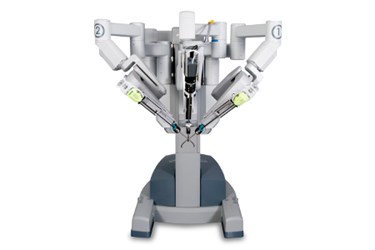Autonomous Robotic Surgery On The Horizon, Says Former Google Researcher

The day when machines will make the decisions in an operating room may soon be upon us, or so says former Google X researcher Babak Parviz, in an interview with Backchannel. Parviz remarked that machines are more precise and scalable than humans, which could translate into surgical procedures that are more accessible and less risky.
In the interview, Parviz said that he was on the team that developed Google Glass and was working on the glucose-sensing contact lens with Novartis when he made the move to Amazon last year. He also claimed to have sold the idea of the autonomous surgical robot to Google in 2010.
Last week, Johnson & Johnson and Verily (formerly Google Life Sciences) formally launched a joint surgical robotics venture called Verb Surgical, signaling to some that another ambitious Google project had grown legs.
Google, which declined to comment to Backchannel about Parviz’s role at the company, has always been tightlipped about its research, especially about what Parviz refers to as their “moonshot ideas.” True to form, Verily has said very little about Verb Surgical and other ongoing projects beyond the abstract, and news outlets have been gleaning information from patents — such as a surgical laser ablation system and a needle-free blood draw device.
Among Google’s “moonshot ideas” known publicly, not many have lived up to the hype. Google Glass — reported Motley Fool — has been a bust, and Alphabet pulled the $1,500 product from the market earlier this year and sent it back to the drawing board.
Still, Parviz suggested in his interview that there is every reason to believe that autonomous surgical robots will become a reality. In his reasoning, he cited precision and accessibility.
“We rely on the dexterity of human surgeons but now we know machines are quite a bit more precise than humans. If you want to do things with extreme precision, a machine would be better,” said Parviz, who added that machines are also capable of thinking and acting more quickly than humans and could complete procedures more quickly and with a reduced risk of complication.
Secondly, he reasoned that machines capable of independent surgery could be manufactured faster than human surgeons could be trained, making — he said — surgical intervention more widely available than is currently possible.
Though robotic equipment has been steadily advancing and becoming commonplace, surgical procedures are still led and controlled by human doctors, who are responsible for all medical decisions and direct the machinery accordingly. Studies conducted by Johns Hopkins and Columbia suggest that robotic surgeries may be more risky than is publicly reported.
Despite concerns, WinterGreen market researchers — cited by Backchannel — estimate the market for surgical robots will reach $20 billion by 2021
Experts — including University of Washington professor of Robotic Law and Policy, Ryan Calo — call the idea of an autonomous surgical robot implausible, and Parviz acknowledged that the reality of an operating room ruled by artificial intelligence (AI) is a long way off.
“By no means I’m saying this is immediate, by no means I’m saying this is easy, by no means I’m saying this is even going to be cheap initially,” said Parviz.
Amazon did not comment on his new role at the company when Parviz made the move last year, but Forbes speculated that by luring Parviz, the online retailer was signaling a shift in its research ambitions.
